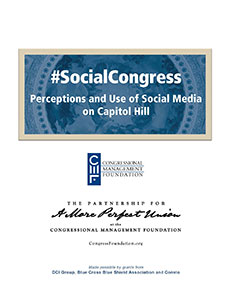Perceptions and Use of Social Media on Capitol Hill
 This 2011 report represents the first research into congressional staffers' attitudes about their offices' use of social media. The findings are based on an online survey of congressional staff that was conducted between October 12 and December 13, 2010. The survey had 260 respondents.
This 2011 report represents the first research into congressional staffers' attitudes about their offices' use of social media. The findings are based on an online survey of congressional staff that was conducted between October 12 and December 13, 2010. The survey had 260 respondents.
"#SocialCongress" was sponsored by DCI Group, Blue Cross Blue Shield Association, and Convio. We thank them for their support of CMF's Partnership for a More Perfect Union.
![]() CMF-Social-Congress-2011 (1.2 MB)
CMF-Social-Congress-2011 (1.2 MB)
If you are having trouble viewing the PDF, read the report via Scribd here: http://j.mp/alt-socialcongress
Note: CMF has published more recent data on this topic in our report, #SocialCongress 2015.
Key Findings
- Congressional offices are using social media to help gauge public opinion, augmenting traditional tools used for that purpose. Nearly two-thirds (64%) of the senior managers and social media managers surveyed think Facebook is a somewhat or very important tool for understanding constituents' views and opinions, 42% say Twitter is somewhat or very important, and 34% say YouTube is somewhat or very important tool for understanding constituents' views and opinions.
- Congressional offices now include social media among the tools used to communicate Senators' and Representatives' views and activities. Nearly three-quarters (74%) of the senior managers and social media managers surveyed think Facebook is somewhat or very important for communicating their Members' views. YouTube is viewed by nearly three-quarters of staffers surveyed (72%) as somewhat or very important for communicating their Members' views. More than half (51%) of the staffers surveyed say Twitter is a somewhat or very important vehicle for their Member's communications.
- Congressional staff feel the benefits of using social media outweigh the risks. A majority of the staffers (55%) feel social media offers their offices more benefits than risks, 14% disagree and the rest are not sure. A strong majority of staffers (72%) believe that social media allows their Members to reach people they had previously not communicated with.
- Younger staffers see more value in social media than their older colleagues. Two-thirds (66%) of the staffers 30 years old and younger feel social media is worth the time their offices spend on it, compared to only about one-third (32%) of their colleagues 51 and older who feel the same. Staffers 30 and younger are less likely than their older colleagues to disagree that social media offers more benefits than risks. Only 7% of staff 30 and younger disagreed, compared to nearly one-quarter (23%) of their colleagues 51 and older who did.
-
Staffers from offices that embrace technology are more likely to see media as a benefit to the office and to believe the Internet has improved the dialogue between citizens and Congress. Most (88%) of the staffers from early-adopter offices feel that social media is enabling their offices to reach people they were not reaching before, compared to 54% of late-adopters who agree with that statement, and 72% of early-adopter staffers feel social media is worth the time their offices spend on it.
- Social media managers have a more positive view of constituent communications than senior managers or staffers who are primarily tasked with answering the mail. More than two-thirds (68%) of social media managers feel email and the Internet have made Senators and Representatives more responsive to their constituents, compared to less than half (46%) of the senior managers.
- Many staffers—especially in Democratic offices—feel their office spends too little time on online communications. More than one-third of the staffers surveyed feel their offices spend too little time on online town hall meetings, posting videos, their official website, and their official blog. Democrats were more likely than Republicans to say their offices do not spend enough time on online communications.


